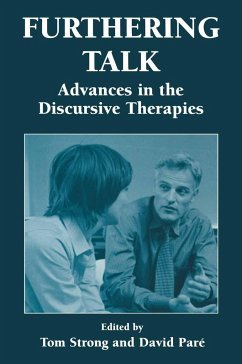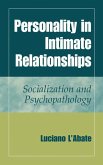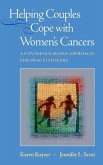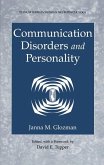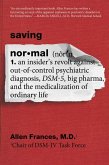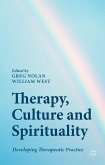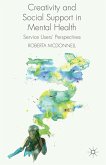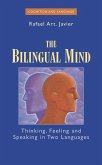Thomas Strong, David Pare, Tom StrongAdvances in the Discursive Therapies
Furthering Talk
Advances in the Discursive Therapies
Herausgegeben:Strong, Thomas; Pare, David
Thomas Strong, David Pare, Tom StrongAdvances in the Discursive Therapies
Furthering Talk
Advances in the Discursive Therapies
Herausgegeben:Strong, Thomas; Pare, David
- Gebundenes Buch
- Merkliste
- Auf die Merkliste
- Bewerten Bewerten
- Teilen
- Produkt teilen
- Produkterinnerung
- Produkterinnerung
This significant volume brings together noted clinicians to offer practical ways of using narrative and other discursive methods of therapy. The innovative ideas presented build upon the social constructionist thinking that has influenced the field for the past decade. It covers topics such as addressing violence, discursive research, and "dialogues" with the authors to demonstrate how these therapies are carried out. Both clinicians and graduate students will find this book of great value.
Andere Kunden interessierten sich auch für
![Personality in Intimate Relationships Personality in Intimate Relationships]() Luciano L'AbatePersonality in Intimate Relationships41,99 €
Luciano L'AbatePersonality in Intimate Relationships41,99 €![Helping Couples Cope with Women's Cancers Helping Couples Cope with Women's Cancers]() Karen KayserHelping Couples Cope with Women's Cancers41,99 €
Karen KayserHelping Couples Cope with Women's Cancers41,99 €![Communication Disorders and Personality Communication Disorders and Personality]() Janna M. GlozmanCommunication Disorders and Personality41,99 €
Janna M. GlozmanCommunication Disorders and Personality41,99 €![Saving Normal Saving Normal]() Allen FrancesSaving Normal17,99 €
Allen FrancesSaving Normal17,99 €![Therapy, Culture and Spirituality Therapy, Culture and Spirituality]() Therapy, Culture and Spirituality81,99 €
Therapy, Culture and Spirituality81,99 €![Creativity and Social Support in Mental Health Creativity and Social Support in Mental Health]() R. McDonnellCreativity and Social Support in Mental Health81,99 €
R. McDonnellCreativity and Social Support in Mental Health81,99 €![The Bilingual Mind The Bilingual Mind]() Rafael Art JavierThe Bilingual Mind81,99 €
Rafael Art JavierThe Bilingual Mind81,99 €-
-
-
This significant volume brings together noted clinicians to offer practical ways of using narrative and other discursive methods of therapy. The innovative ideas presented build upon the social constructionist thinking that has influenced the field for the past decade. It covers topics such as addressing violence, discursive research, and "dialogues" with the authors to demonstrate how these therapies are carried out. Both clinicians and graduate students will find this book of great value.
Produktdetails
- Produktdetails
- Verlag: Springer, Berlin
- Seitenzahl: 308
- Erscheinungstermin: 1. Januar 2004
- Englisch
- Abmessung: 235mm x 157mm x 23mm
- Gewicht: 537g
- ISBN-13: 9780306479076
- ISBN-10: 0306479079
- Artikelnr.: 21529602
- Herstellerkennzeichnung
- Libri GmbH
- Europaallee 1
- 36244 Bad Hersfeld
- gpsr@libri.de
- Verlag: Springer, Berlin
- Seitenzahl: 308
- Erscheinungstermin: 1. Januar 2004
- Englisch
- Abmessung: 235mm x 157mm x 23mm
- Gewicht: 537g
- ISBN-13: 9780306479076
- ISBN-10: 0306479079
- Artikelnr.: 21529602
- Herstellerkennzeichnung
- Libri GmbH
- Europaallee 1
- 36244 Bad Hersfeld
- gpsr@libri.de
Thomas Strong, Ph.D. is a psychologist and counselor educator at the University of Calgary. Formerly a practitioner throughout northwestern British Columbia, he recently re-entered academic life to explore the possibilities of discursive and postmodern thought for collaborative practice. Inspired by dialogica thinkers like Bakhtin, Garfinkel and Wittgenstein, his writing explores pragmatic and ethical issues such thought holds for psychotherapy, health conversations, and counselor education/supervision. Strong is also involved. In the Discursive Therapies ("The Virtual Faculty") graduate program offered online from Massey University in New Zealand. David Paré, Ph.D. is a psychologist and counselor educator at the University of Ottawa as well as co-director (with Mishka Lysack) of the Glebe Institute, A Centre for Constructive and Collaborative Practice, in Ottawa, Ontario, Canada. For the past decade his work has focused on the `postmodern turn in family therapy and psychotherapy. David has a particular interest in narrative ideas and practices; in addition to writing and presenting widely on that topic, he offers training and supervision to practitioners interested in developing collaborative therapeutic practices. He is currently conducting participatory action research with students into the process of teaching and learning collaborative therapy.
Striving for Perspicuity: Talking Our Way Forward; Tom Strong and David Paré.-
Levinas: Therapy as Discourse Ethics; Glenn Larner with Peter Rober and Tom Strong.-
Acknowledging the Otherness of The Other: Poetic Knowing in Practice and the Fallacy of Misplaced Systematicity; Arlene Katz M. and John Shotter with Jaakko Siekkula.-
Narrating the Difference; Johnella Bird with Catherine Cook.-
Power, Authority, and Pointless Activity: The Developmental Discourse of Social Therapy; Lois Holzman and Fred Newman with Tom Strong.-
A Postmodern Collaborative Approach: A Family s Reflections on "In-the-Room" and "On-the-Challenge Course" Therapy. It s all Language; Harlene Anderson and Paul Burney with Sue Levin.-
The Client s Nonverbal Utterances, Creative Understanding & the Therapist s Inner Conversation; Peter Rober with Glenn Larner and David Paré.-
Discursive Approaches to Clinical Research; Jerry Gale and John Lawless with Kathryn Roulston.-
Coming to Terms with Violence and Resistance: From a Language of Effects to a Language of Responses; Nick Todd and Alan Wade with Martine Renoux.-
What s Love Got to do with it? Managing Discursive Positions and Mediating Conflict Within a Heterosexual Love Relationship; Gerald Monk and Stacey L. Sinclair with Craig Smith.-
Certainties v. Epiphanies: Forensic Therapies and Adversarial Assessments; Tom Conran with Tom Strong and Bradford Keeney.-
Mesmerizing Violent Offenders with a Slice of Life: Drama and Reflexivity in the Treatment of Men who Abuse their Spouses; Bill Hanec with Don Baker.-
Radical Youthwork: Creating and Becoming Everyone; Hans Skott-Myhre with Jessica Skott-Myhre, Kathy Skott-Myrhe and Reggie Harris.-
Response-Able Practice: A Language of Gifts in the Institutions of Health Care; Christopher J. Kinman and Peter Finck with Lynn Hoffman.-
Therapy as a Social Construction: Back to Basics and Forward toward Challenging Issues; Sheila McNamee with Lois Shawver.
Levinas: Therapy as Discourse Ethics; Glenn Larner with Peter Rober and Tom Strong.-
Acknowledging the Otherness of The Other: Poetic Knowing in Practice and the Fallacy of Misplaced Systematicity; Arlene Katz M. and John Shotter with Jaakko Siekkula.-
Narrating the Difference; Johnella Bird with Catherine Cook.-
Power, Authority, and Pointless Activity: The Developmental Discourse of Social Therapy; Lois Holzman and Fred Newman with Tom Strong.-
A Postmodern Collaborative Approach: A Family s Reflections on "In-the-Room" and "On-the-Challenge Course" Therapy. It s all Language; Harlene Anderson and Paul Burney with Sue Levin.-
The Client s Nonverbal Utterances, Creative Understanding & the Therapist s Inner Conversation; Peter Rober with Glenn Larner and David Paré.-
Discursive Approaches to Clinical Research; Jerry Gale and John Lawless with Kathryn Roulston.-
Coming to Terms with Violence and Resistance: From a Language of Effects to a Language of Responses; Nick Todd and Alan Wade with Martine Renoux.-
What s Love Got to do with it? Managing Discursive Positions and Mediating Conflict Within a Heterosexual Love Relationship; Gerald Monk and Stacey L. Sinclair with Craig Smith.-
Certainties v. Epiphanies: Forensic Therapies and Adversarial Assessments; Tom Conran with Tom Strong and Bradford Keeney.-
Mesmerizing Violent Offenders with a Slice of Life: Drama and Reflexivity in the Treatment of Men who Abuse their Spouses; Bill Hanec with Don Baker.-
Radical Youthwork: Creating and Becoming Everyone; Hans Skott-Myhre with Jessica Skott-Myhre, Kathy Skott-Myrhe and Reggie Harris.-
Response-Able Practice: A Language of Gifts in the Institutions of Health Care; Christopher J. Kinman and Peter Finck with Lynn Hoffman.-
Therapy as a Social Construction: Back to Basics and Forward toward Challenging Issues; Sheila McNamee with Lois Shawver.
Striving for Perspicuity: Talking Our Way Forward; Tom Strong and David Paré.-
Levinas: Therapy as Discourse Ethics; Glenn Larner with Peter Rober and Tom Strong.-
Acknowledging the Otherness of The Other: Poetic Knowing in Practice and the Fallacy of Misplaced Systematicity; Arlene Katz M. and John Shotter with Jaakko Siekkula.-
Narrating the Difference; Johnella Bird with Catherine Cook.-
Power, Authority, and Pointless Activity: The Developmental Discourse of Social Therapy; Lois Holzman and Fred Newman with Tom Strong.-
A Postmodern Collaborative Approach: A Family s Reflections on "In-the-Room" and "On-the-Challenge Course" Therapy. It s all Language; Harlene Anderson and Paul Burney with Sue Levin.-
The Client s Nonverbal Utterances, Creative Understanding & the Therapist s Inner Conversation; Peter Rober with Glenn Larner and David Paré.-
Discursive Approaches to Clinical Research; Jerry Gale and John Lawless with Kathryn Roulston.-
Coming to Terms with Violence and Resistance: From a Language of Effects to a Language of Responses; Nick Todd and Alan Wade with Martine Renoux.-
What s Love Got to do with it? Managing Discursive Positions and Mediating Conflict Within a Heterosexual Love Relationship; Gerald Monk and Stacey L. Sinclair with Craig Smith.-
Certainties v. Epiphanies: Forensic Therapies and Adversarial Assessments; Tom Conran with Tom Strong and Bradford Keeney.-
Mesmerizing Violent Offenders with a Slice of Life: Drama and Reflexivity in the Treatment of Men who Abuse their Spouses; Bill Hanec with Don Baker.-
Radical Youthwork: Creating and Becoming Everyone; Hans Skott-Myhre with Jessica Skott-Myhre, Kathy Skott-Myrhe and Reggie Harris.-
Response-Able Practice: A Language of Gifts in the Institutions of Health Care; Christopher J. Kinman and Peter Finck with Lynn Hoffman.-
Therapy as a Social Construction: Back to Basics and Forward toward Challenging Issues; Sheila McNamee with Lois Shawver.
Levinas: Therapy as Discourse Ethics; Glenn Larner with Peter Rober and Tom Strong.-
Acknowledging the Otherness of The Other: Poetic Knowing in Practice and the Fallacy of Misplaced Systematicity; Arlene Katz M. and John Shotter with Jaakko Siekkula.-
Narrating the Difference; Johnella Bird with Catherine Cook.-
Power, Authority, and Pointless Activity: The Developmental Discourse of Social Therapy; Lois Holzman and Fred Newman with Tom Strong.-
A Postmodern Collaborative Approach: A Family s Reflections on "In-the-Room" and "On-the-Challenge Course" Therapy. It s all Language; Harlene Anderson and Paul Burney with Sue Levin.-
The Client s Nonverbal Utterances, Creative Understanding & the Therapist s Inner Conversation; Peter Rober with Glenn Larner and David Paré.-
Discursive Approaches to Clinical Research; Jerry Gale and John Lawless with Kathryn Roulston.-
Coming to Terms with Violence and Resistance: From a Language of Effects to a Language of Responses; Nick Todd and Alan Wade with Martine Renoux.-
What s Love Got to do with it? Managing Discursive Positions and Mediating Conflict Within a Heterosexual Love Relationship; Gerald Monk and Stacey L. Sinclair with Craig Smith.-
Certainties v. Epiphanies: Forensic Therapies and Adversarial Assessments; Tom Conran with Tom Strong and Bradford Keeney.-
Mesmerizing Violent Offenders with a Slice of Life: Drama and Reflexivity in the Treatment of Men who Abuse their Spouses; Bill Hanec with Don Baker.-
Radical Youthwork: Creating and Becoming Everyone; Hans Skott-Myhre with Jessica Skott-Myhre, Kathy Skott-Myrhe and Reggie Harris.-
Response-Able Practice: A Language of Gifts in the Institutions of Health Care; Christopher J. Kinman and Peter Finck with Lynn Hoffman.-
Therapy as a Social Construction: Back to Basics and Forward toward Challenging Issues; Sheila McNamee with Lois Shawver.

